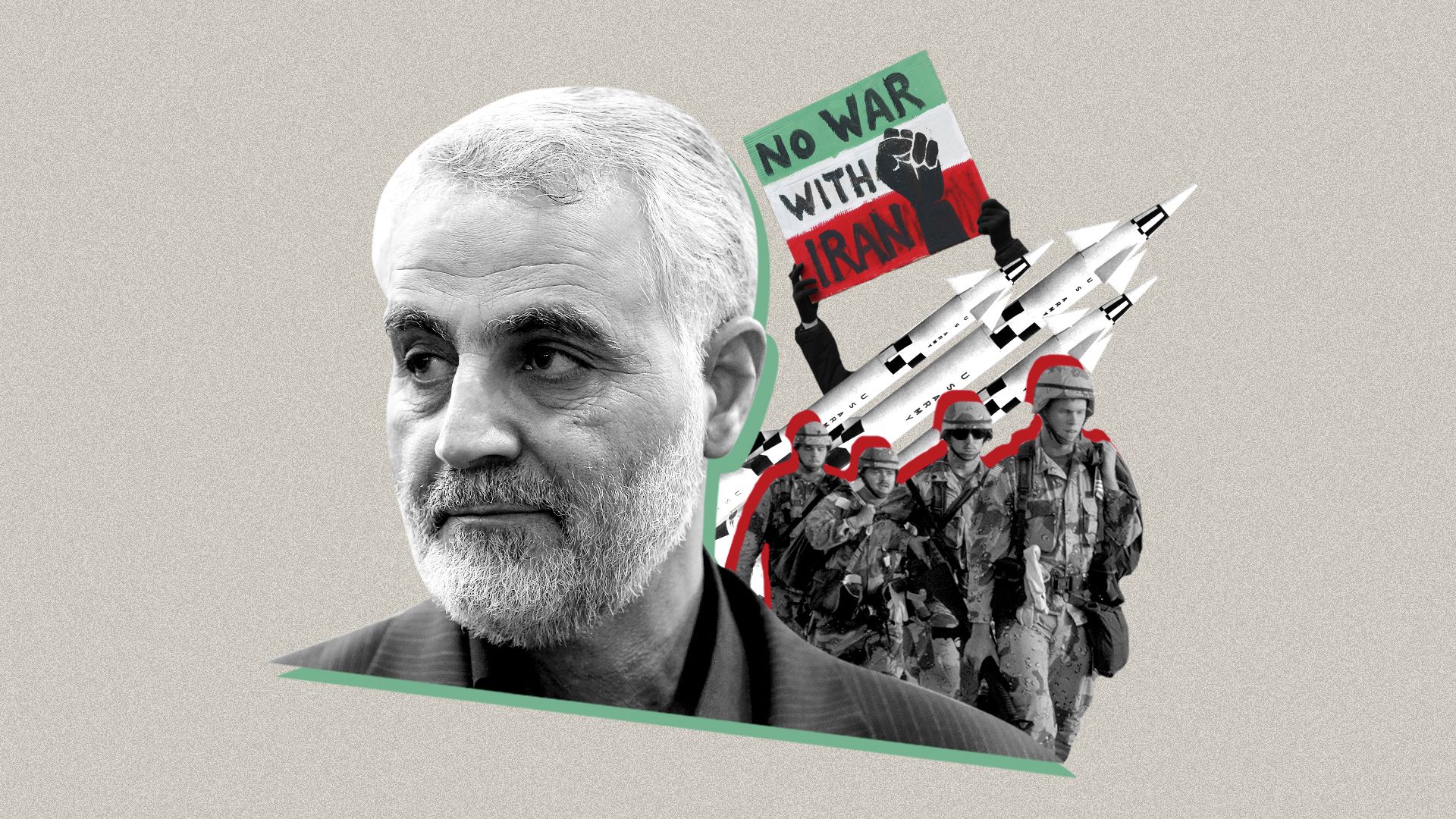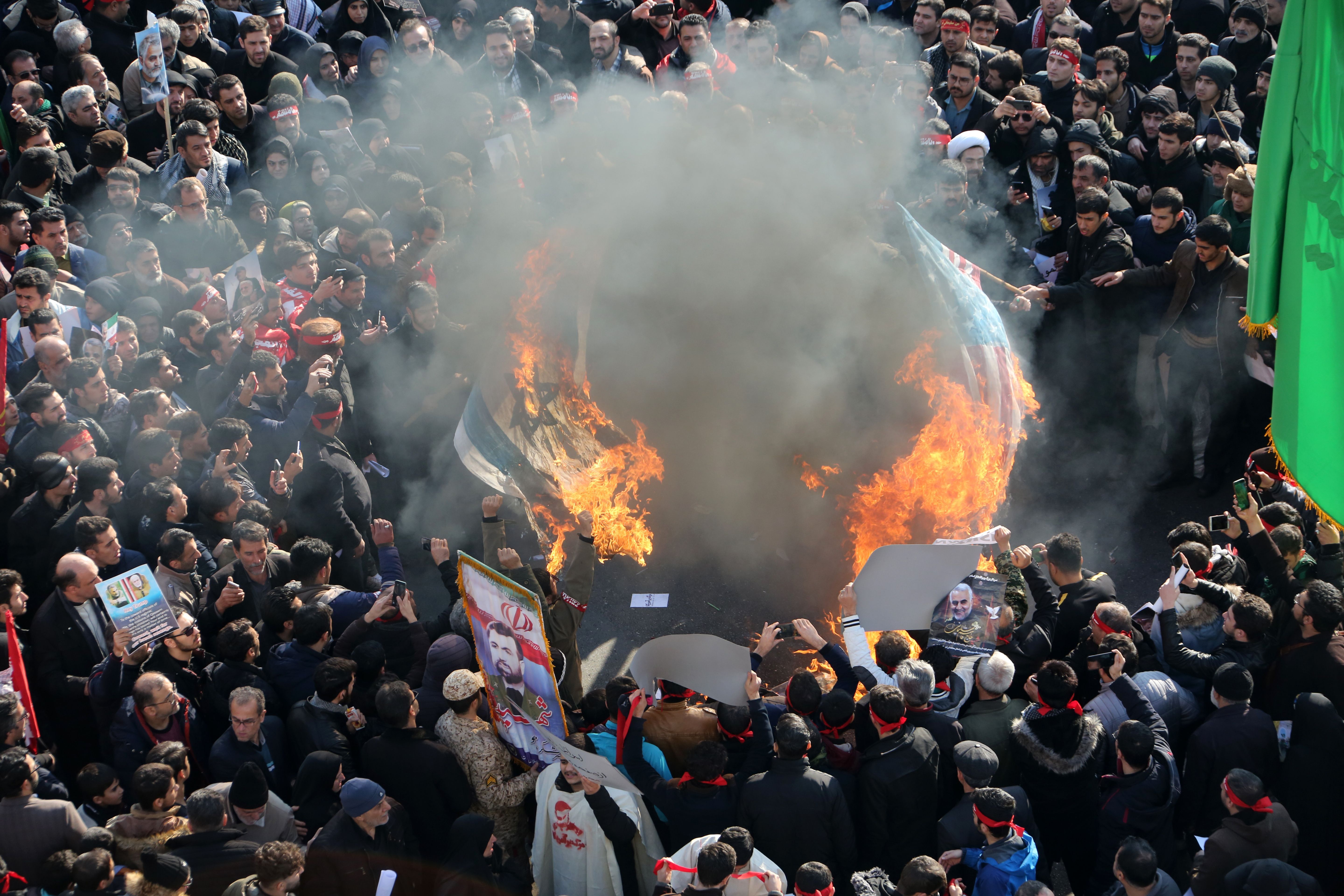
Illustration: Aïda Amer/Axios. Photos: Tom Stoddart Archive/Getty Contributor, Adam Glickman/Underwood Archives/Getty Contributor, Mehdi Ghasemi/Getty Contributor, NurPhoto/Getty Contributor
The killing of Qasem Soleimani unleashed immediate fears of war — even of World War III — but if no further shots are fired, Thursday's airstrikes in Baghdad will nonetheless generate momentous consequences.
The big picture: Iran has lost its best military strategist, and America has eliminated a man it saw as a singularly destructive actor in the region. But the current U.S. concerns aren't limited to where and when Iran will strike back.
What to watch...
1. The U.S. military presence in Iraq has quickly begun to look untenable, both due to the threat of Iranian reprisals and because Iraq appears set to revoke its invitation following the American attack on its soil.
Driving the news: Secretary of Defense Mark Esper and Joint Chiefs chairman Gen. Mark Milley were forced tonight to hastily deny that the U.S. was pulling troops out of Iraq.
- That followed the emergence of a letter from Brig. Gen. William Seely informing the Iraqi military that the anti-ISIS coalition would be "repositioning forces" and preparing to move "out of Iraq."
- The letter was reportedly delivered to Baghdad, but Milley said it was a “poorly worded” draft that shouldn’t have been released.
- It came a day after the Iraqi parliament voted in a non-binding resolution to demand that foreign forces leave the country.
- Trump responded by declaring that America would not leave unless it was paid for its “extraordinarily expensive air base."
Why it matters: Forcing the U.S. out of the region has been a primary objective of Tehran and Soleimani’s personal mission. A sudden U.S. exit would also give ISIS space to rebuild its strength, particularly as the U.S. would likely leave Syria too.
- The flipside: International Crisis Group president Robert Malley noted during a briefing with reporters this afternoon that Trump may ultimately embrace this as an opportunity to get out of the Middle East.
2. Iran’s announcement yesterday that it will now enrich uranium “without restrictions” — unconstrained by the 2015 nuclear deal — loomed as a possibility ever since Trump withdrew from the deal in May 2018.
- But Trump's administration for months expressed confidence that Iran would not get to this point, because that would turn the world — in particular the Europeans — against it.
- Few howls of outrage accompanied Iran’s announcement, though, because the U.S. now looks to many like the aggressor. Iran also tempered some fears by noting it would continue to provide access to inspectors.
- While France, Germany and the U.K. expressed concern, they’re still attempting to mediate rather than lining up behind their American ally.
Meanwhile...
- 3. The Iranian regime is riding a tide of patriotic sentiment just weeks after anti-government protests threatened to rattle its foundations.
- 4. A deepening crisis with Iran will crowd out other priorities, including a "great power competition" with Russia and China, not to mention ISIS.
- 5. The killing of a top Iranian official in a foreign country could not only put U.S. generals and officials in the Middle East at risk, it “will be invoked by various parties” in the future to justify assassinations, Malley says.

State of play: Iran's full reaction is still yet to take shape.
- “Right now what [the Iranians] are doing is sitting back and accumulating some of the immediate political benefits of what just happened — the vote in the Iraqi parliament, massive demonstrations in Iran and also in Iraq, popular sentiment among the Shiites in Lebanon, strengthening of the Iranian axis and what they’re doing on the nuclear front,” says Malley, a former Obama adviser.
- “At some point, it’s going to be very difficult for them not to take some type of response,” he adds. “Then, of course, the ball will be back in President Trump’s court.”
Most analysts agree that Iran must, in its view, hit back hard enough to assert its strength while aiming to avert a potentially crippling military confrontation with the U.S.
- Trump has drawn a clear red line over attacks on U.S. personnel and interests, but strikes on allies like Saudi Arabia have not drawn similar ire. That will only add to the concerns of America's regional partners.
Behind the scenes: Israeli Prime Minister Benjamin Netanyahu told his Security Cabinet today that Israel was not involved in Soleimani’s killing and must not be dragged into the escalating conflict, two ministers who attended the meeting tell Axios contributor Barak Ravid.
- Meanwhile, Barak reports, Saudi Crown Prince Mohammed bin Salman urgently dispatched his brother Prince Khalid to Washington today to meet with top officials, including Secretary of State Mike Pompeo, and urge restraint.
- Both Israel and Saudi Arabia deplored Soleimani, but both are also afraid of being targeted by Iran or swept up in a U.S.-Iran war.
What to watch: Israel’s intelligence chiefs told the Cabinet today that Iran will start developing its retaliation on Tuesday when the period of national mourning ends.
- Hezbollah leader Hassan Nasrallah, who is close to Tehran, said Sunday that U.S. military assets should be targeted, but not civilians.
- Oman and Qatar could both be key to any de-escalation efforts.
The bottom line: Even if the most dire predictions of war don't come to fruition, the impact of Soleimani's death will be felt for years to come.
